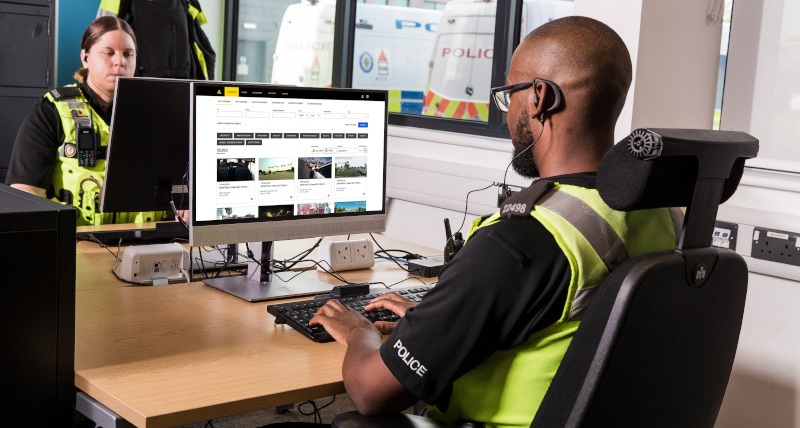
Think about the following questions.
1. What do you know about Bitcoin and other cryptocurrencies?
2. Do you know anyone who has been the victim of online crime?
3. What do you think can be done to stop online criminals?
VOCABULARY PREVIEW
Match each New Academic Word List(NAWL) word with the correct definition.
- accumulate
- detection _____
- goods _____
- enforcement _____
- deficiency _____
- interestingly _____
- a. used to introduce information that the speaker thinks is surprising or significant
- b. the process of making people obey a law or rule
- c. the state of not having enough of something that is needed
- d. to increase in number or amount over time
- e. items that are made to be sold
- f. the fact of noticing or discovering information about something, especially crimes
DIGITAL COPS AND ROBBERS

Thanks to recent advances in technology, communicating, storing information, and paying for things are easier than ever before. However, by using these same technological advances, criminals are finding ever more inventive1 ways to break the law and avoid being caught. This is making law enforcement increasingly challenging.
For criminals, cryptocurrencies like Bitcoin have provided a new way to send money around the world. Cryptocurrencies are currencies that are produced by public computer networks rather than governments. It is estimated that forty percent of organized crime in Europe now takes place using cryptocurrencies. This includes the buying and selling of illegal goods such as drugs or guns, and payments for illegal services like prostitution and contract killing. Terrorist organizations also use cryptocurrencies, raising funds2 via donations or criminal activity. In 2015, one Bitcoin wallet that accumulated $23 million in one month was later found by hackers to belong to the terrorist organization Islamic State.
Cryptocurrencies have several advantages for criminals. First, users can remain anonymous3 because the system which records cryptocurrency transactions, a blockchain, does not require users to leave names, addresses, or bank account numbers. (Though clearly, their anonymity is not always safe from talented online detectives.) Much like money in a bank, cryptocurrencies are held by an impartial4 third party, but cryptocurrencies are even more secure. Traditional banks are obliged5 to work closely with government agencies, so the detection of illegal payments is quick and efficient. Historically, without a reliable way to exchange money, criminals often tricked each other by using fake6 banknotes. Obviously, in these situations, no criminal could contact the police, so cryptocurrencies have given criminals a new sense of security.
Furthermore, criminals trade cryptocurrencies via the dark web, a huge hidden area of the internet not accessible through normal browsers. Specialized7 software allows criminals access to the dark web and makes their identities even harder to trace8. Interestingly, this software was originally developed by the US government during the 1990s so that spies could communicate in secret.
Other technologically advanced crimes affect ordinary people more often. Malware, short for malicious software, refers to programs used to gain illegal access to systems and networks. Malware is created by programmers9 who aim to steal money or information through cyberattacks. It usually finds its way into our laptops via emails or infected websites. Malware takes many forms: Keyloggers record everything we type, allowing criminals to identify passwords and personal data. Ransomware locks accounts or takes personal information and demands money to reopen the account or return the information. Meanwhile, phishing malware sends messages to trick people into sharing information or money.
The US Federal Bureau of Investigation (FBI) estimates that altogether, malware costs the economy as much as $3.5 billion a year. Sophisticated malware can even be used to access the private networks of governments, as during the 2016 US presidential election when it was suggested that Russian hackers tried to interfere with the voting process by accessing voting databases.
Government agencies like the FBI are constantly working to trace hidden cryptocurrency transactions and cyberattacks. In 2019, the bureau increased spending on fighting cybercrime by $70.5 million. In truth, criminals always leave "digital footprints"; it is just a case of having the right knowledge and equipment to find them. This means that organizations like the FBI need to hire the very best tech experts and developers. However, since the world's top IT companies can afford to pay far higher salaries, the best tech minds are more likely to join Google than the FBI. To address their skill deficiency, the FBI has introduced incentives10. They pay for the best young tech graduates to complete a master's course at Carnegie Mellon University. In exchange, they must work for the FBI for at least three years. This kind of program looks likely to become more common as governments struggle to keep up with the pace of technological change, and with the criminals who take advantage of it.
New Academic Word List
- inventive 1 : adj. showing the ability to think of something new
- fund 2 : n. an amount of money used for a specific purpose
- anonymous 3 : adj. made or done by someone whose name is not known
- impartial 4 : adj. not supporting any of the sides in an argument or negotiation
- oblige 5 : v. to force or require a person or organization to do something because of a law or rule or because it is necessary
- fake 6 : adj. meant to look real or genuine but not real or genuine
- specialized 7 : adj. made or used for one particular purpose, job, place, etc.
- trace 8 : v. to follow something back to its cause, beginning, or origin
- programmer 9 : n. a person whose job is to create computer programs
- incentive 10 : n. something that encourages a person to do something
READING COMPREHENSION
A ‣ Mark each statement as true (T) or false (F) according to the reading.
- Cryptocurrency is used in a majority of European organized criminal activities.
- True
- False
- A terrorist group raised $23 million in cryptocurrency in a short period of time.
- True
- False
- The dark web was first created for the use of criminal networks.
- True
- False
- Keyloggers keep users from being able to access their accounts.
- True
- False
- The FBI is investing a lot in new recruits to compete with the tech industry.
- True
- False
B ‣ Choose the best answer according to the reading.
- What is the main idea of the reading?
- a. Technology is transforming the way criminals operate.
- b. Technology is making it easier for the police to catch criminals.
- c. Technology is ensuring the public is safer than ever before.
- d. Technology is costing the FBI a great deal of money each year.
- Which is NOT mentioned as an advantage of cryptocurrencies for criminals?
- a. They can be used to accumulate money for criminal services.
- b. They make it easier to keep your identity secret.
- c. They are constantly growing in value.
- d. They make it harder to be cheated.
- What is stated about malware?
- a. Most of it works in quite similar ways.
- b. It is often legal, as long as no money is taken.
- c. It can be avoided by protecting your passwords.
- d. It could be a threat to government systems.
- Which is probably true about the FBI?
- a. They believe the best tech minds find crime-fighting exciting.
- b. They want their cybercrime staff to move on after three years.
- c. They think Carnegie Mellon has exceptional technology courses.
- d. They are of the opinion that Google pays too much to workers.
C ‣ The following terms are explained in the reading. Write definitions for them.
- blockchain:
_____ - dark web:
_____ - malware:
_____
SUMMARY
Fill in the blanks with the phrases in the box.
- commit cyberattacks
- pace of change
- gaining illegal access
- talented programmers
- used anonymously
- sense of security
| How is Technology Changing Crime? | |
|
Cryptocurrencies
|
Malware
|
|
|
VOCABULARY PRACTICE
Fill in the blanks with the words in the box. Change the form if necessary.
- interestingly
- deficiency
- enforcement
- accumulate
- detection
- goods
- The _____ of speed limits helps to keep drivers and pedestrians safe.
- After two years, the YouTube influencer had _____ two million followers.
- Many _____ sold in North America are imported from developing countries such as Vietnam.
- Dogs' strong sense of smell is often used to help in the _____ of drugs.
- _____ , the koala "bear" is not a bear at all; in fact, it is more closely related to the kangaroo.
- When people have an iron _____ , they have a lack of iron in their blood; this can make them pale and tired.
SUPPLEMENTAL READING
Silk Road

In 2011, a new online marketplace, Silk Road, was launched. As with sites like eBay, Silk Road allowed sellers to advertise goods and buyers anywhere on Earth to purchase them—a simple, successful model. The major difference was that seventy percent of the goods for sale on the site were illegal drugs, and users could also buy fake IDs and tax-free cigarettes. Transactions took place using Bitcoin, which meant buyers and sellers could remain anonymous.
Silk Road was only accessible via the dark web, but even so, by 2013, it claimed to be selling $1.3 million worth of illegal goods every week. The FBI had spent two years using the latest technology to try and shut the site down, but with no success-all they really knew was that the site was run by a mysterious figure, Dread Pirate Roberts.
However, a young agent with the US federal tax agency, Gary Alford, began investigating in his spare time. Alford used simple Google searches and filters to find content about how to sell drugs online. In an old posting on a chat forum about Bitcoin, he found that one user had shared his or her email address: rossulbricht@gmail.com.
Agent Alford found that this user was logging in from San Francisco. He took the information to senior agents, but they ignored it; surely, it couldn't be that easy. However, further investigation found more links between Silk Road and the Californian city, so the FBI moved in. They followed Ross Ulbricht to a public library, and while one agent distracted him, another grabbed his laptop. He was logged into Silk Road as Dread Pirate Roberts.
Ulbricht, a 28-year-old master's graduate of Penn State University, was found guilty of computer hacking and drug trafficking. He was sentenced to life in prison with no possibility of release.
Fill in the blanks with information from the reading.
- Most of the goods for sale on Silk Road were _____ .
- Gary Alford began _____ the site in his own time by using ordinary Google searches.
- Ross Ulbricht was finally caught when he was found to be _____ the website as its operator.

Leave a comment
Load more